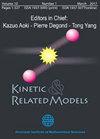具有短距离通信权值的延迟cucker - small模型
IF 1.5
4区 数学
Q1 MATHEMATICS
引用次数: 2
摘要
Various flocking results have been established for the delayed Cucker-Smale model, especially in the long range communication case. However, the short range communication case is more realistic due to the limited communication ability. In this case, the non-flocking behavior can be frequently observed in numerical simulations. Furthermore, it has potential applications in many practical situations, such as the opinion disagreement in society, fish flock breaking and so on. Therefore, we firstly consider the non-flocking behavior of the delayed Cucker\begin{document}$ - $\end{document}Smale model. Based on a key inequality of position variance, a simple sufficient condition of the initial data to the non-flocking behavior is established. Then, for general communication weights we obtain a flocking result, which also depends upon the initial data in the short range communication case. Finally, with no restriction on the initial data we further establish other large time behavior of classical solutions.本文章由计算机程序翻译,如有差异,请以英文原文为准。
The delayed Cucker-Smale model with short range communication weights
Various flocking results have been established for the delayed Cucker-Smale model, especially in the long range communication case. However, the short range communication case is more realistic due to the limited communication ability. In this case, the non-flocking behavior can be frequently observed in numerical simulations. Furthermore, it has potential applications in many practical situations, such as the opinion disagreement in society, fish flock breaking and so on. Therefore, we firstly consider the non-flocking behavior of the delayed Cucker\begin{document}$ - $\end{document}Smale model. Based on a key inequality of position variance, a simple sufficient condition of the initial data to the non-flocking behavior is established. Then, for general communication weights we obtain a flocking result, which also depends upon the initial data in the short range communication case. Finally, with no restriction on the initial data we further establish other large time behavior of classical solutions.
求助全文
通过发布文献求助,成功后即可免费获取论文全文。
去求助
来源期刊
CiteScore
2.10
自引率
10.00%
发文量
36
审稿时长
>12 weeks
期刊介绍:
KRM publishes high quality papers of original research in the areas of kinetic equations spanning from mathematical theory to numerical analysis, simulations and modelling. It includes studies on models arising from physics, engineering, finance, biology, human and social sciences, together with their related fields such as fluid models, interacting particle systems and quantum systems. A more detailed indication of its scope is given by the subject interests of the members of the Board of Editors. Invited expository articles are also published from time to time.

 求助内容:
求助内容: 应助结果提醒方式:
应助结果提醒方式:


